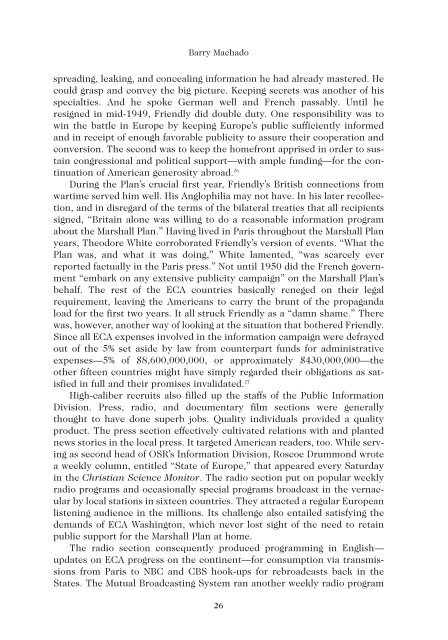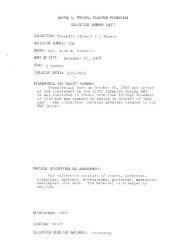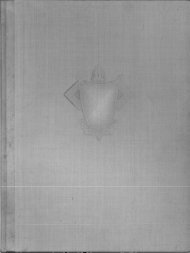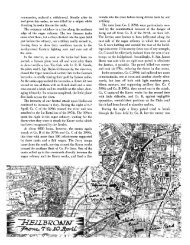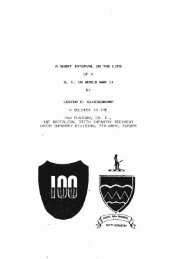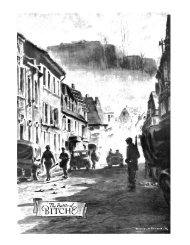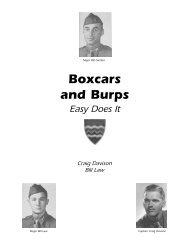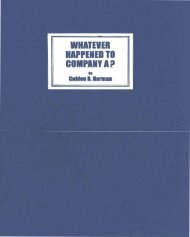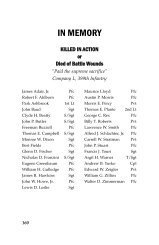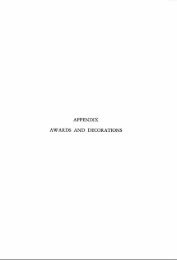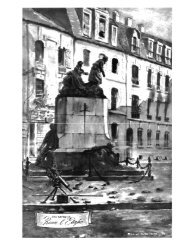Selling the Marshall Plan - The George C. Marshall Foundation
Selling the Marshall Plan - The George C. Marshall Foundation
Selling the Marshall Plan - The George C. Marshall Foundation
You also want an ePaper? Increase the reach of your titles
YUMPU automatically turns print PDFs into web optimized ePapers that Google loves.
Barry Machado<br />
spreading, leaking, and concealing information he had already mastered. He<br />
could grasp and convey <strong>the</strong> big picture. Keeping secrets was ano<strong>the</strong>r of his<br />
specialties. And he spoke German well and French passably. Until he<br />
resigned in mid-1949, Friendly did double duty. One responsibility was to<br />
win <strong>the</strong> battle in Europe by keeping Europe’s public sufficiently informed<br />
and in receipt of enough favorable publicity to assure <strong>the</strong>ir cooperation and<br />
conversion. <strong>The</strong> second was to keep <strong>the</strong> homefront apprised in order to sustain<br />
congressional and political support—with ample funding—for <strong>the</strong> continuation<br />
of American generosity abroad. 26<br />
During <strong>the</strong> <strong>Plan</strong>’s crucial first year, Friendly’s British connections from<br />
wartime served him well. His Anglophilia may not have. In his later recollection,<br />
and in disregard of <strong>the</strong> terms of <strong>the</strong> bilateral treaties that all recipients<br />
signed, “Britain alone was willing to do a reasonable information program<br />
about <strong>the</strong> <strong>Marshall</strong> <strong>Plan</strong>.” Having lived in Paris throughout <strong>the</strong> <strong>Marshall</strong> <strong>Plan</strong><br />
years, <strong>The</strong>odore White corroborated Friendly’s version of events. “What <strong>the</strong><br />
<strong>Plan</strong> was, and what it was doing,” White lamented, “was scarcely ever<br />
reported factually in <strong>the</strong> Paris press.” Not until 1950 did <strong>the</strong> French government<br />
“embark on any extensive publicity campaign” on <strong>the</strong> <strong>Marshall</strong> <strong>Plan</strong>’s<br />
behalf. <strong>The</strong> rest of <strong>the</strong> ECA countries basically reneged on <strong>the</strong>ir legal<br />
requirement, leaving <strong>the</strong> Americans to carry <strong>the</strong> brunt of <strong>the</strong> propaganda<br />
load for <strong>the</strong> first two years. It all struck Friendly as a “damn shame.” <strong>The</strong>re<br />
was, however, ano<strong>the</strong>r way of looking at <strong>the</strong> situation that bo<strong>the</strong>red Friendly.<br />
Since all ECA expenses involved in <strong>the</strong> information campaign were defrayed<br />
out of <strong>the</strong> 5% set aside by law from counterpart funds for administrative<br />
expenses—5% of $8,600,000,000, or approximately $430,000,000—<strong>the</strong><br />
o<strong>the</strong>r fifteen countries might have simply regarded <strong>the</strong>ir obligations as satisfied<br />
in full and <strong>the</strong>ir promises invalidated. 27<br />
High-caliber recruits also filled up <strong>the</strong> staffs of <strong>the</strong> Public Information<br />
Division. Press, radio, and documentary film sections were generally<br />
thought to have done superb jobs. Quality individuals provided a quality<br />
product. <strong>The</strong> press section effectively cultivated relations with and planted<br />
news stories in <strong>the</strong> local press. It targeted American readers, too. While serving<br />
as second head of OSR’s Information Division, Roscoe Drummond wrote<br />
a weekly column, entitled “State of Europe,” that appeared every Saturday<br />
in <strong>the</strong> Christian Science Monitor. <strong>The</strong> radio section put on popular weekly<br />
radio programs and occasionally special programs broadcast in <strong>the</strong> vernacular<br />
by local stations in sixteen countries. <strong>The</strong>y attracted a regular European<br />
listening audience in <strong>the</strong> millions. Its challenge also entailed satisfying <strong>the</strong><br />
demands of ECA Washington, which never lost sight of <strong>the</strong> need to retain<br />
public support for <strong>the</strong> <strong>Marshall</strong> <strong>Plan</strong> at home.<br />
<strong>The</strong> radio section consequently produced programming in English—<br />
updates on ECA progress on <strong>the</strong> continent—for consumption via transmissions<br />
from Paris to NBC and CBS hook-ups for rebroadcasts back in <strong>the</strong><br />
States. <strong>The</strong> Mutual Broadcasting System ran ano<strong>the</strong>r weekly radio program<br />
26


